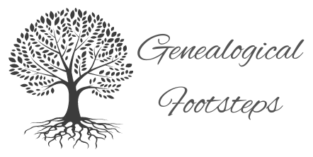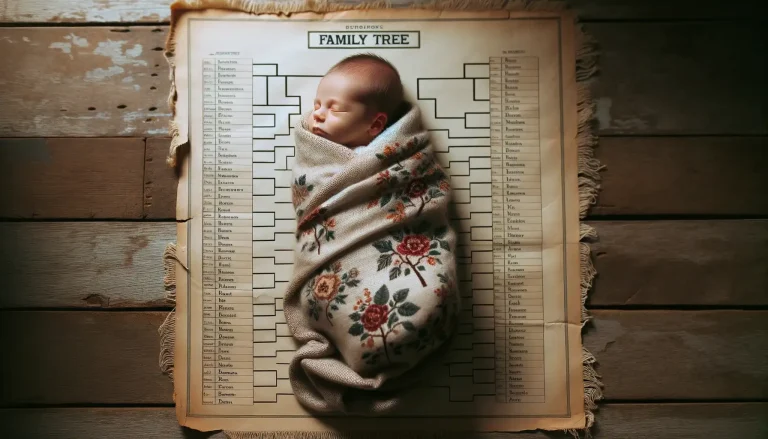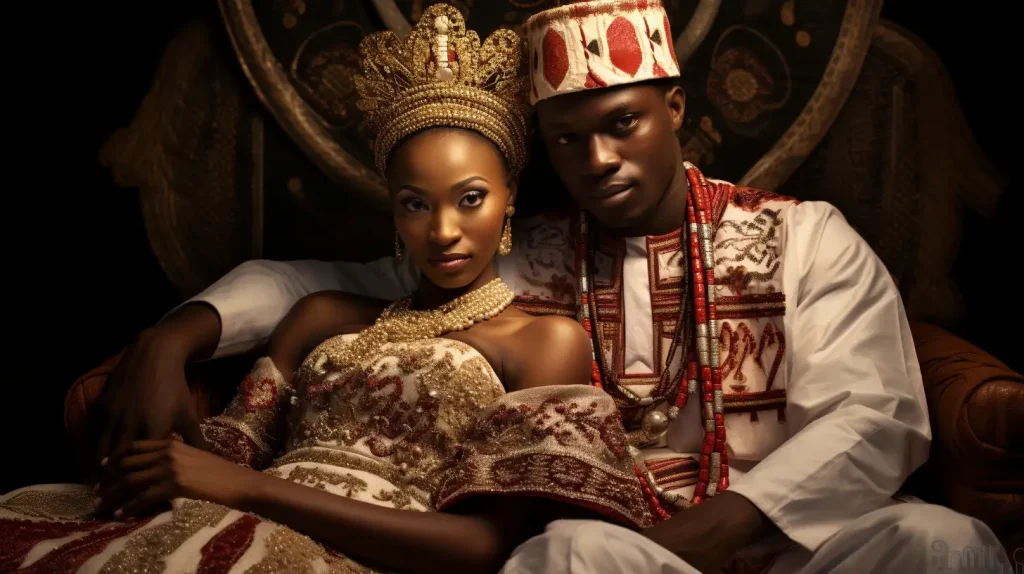Family names are more than just a random combination of letters. They hold significance, telling stories of ancestral roots, cultural practices, and family traditions. From hereditary naming patterns to unique cultural naming practices, the choice and history of a family name can reveal much about a family’s identity, heritage, and values.
This article will explore the topic of family naming patterns and traditions, providing insights into the different ways names are chosen and passed down through generations. It takes into account cultural and historical factors, highlighting the significance of names in shaping personal and familial identity.
Key Takeaways:
- Family naming patterns hold cultural and personal significance, often revealing insights into heritage and values.
- Hereditary naming practices, such as passing down names from parents to children, are common across cultures.
- Some cultures use generational naming patterns, like using a specific starting letter for each child’s name.
- Family surnames are often passed down through the father’s side, providing a glimpse into lineage and history.
- Cultural naming practices vary, reflecting societal values and beliefs, such as using family surnames as first names in the Southern United States.
- Religious influences, like Christian, Jewish, and Islamic traditions, also play a role in naming practices.
- Modern tools like genealogical software and DNA testing have revolutionised the tracking of family names and lineages.
Exploring Family Naming Patterns
Hereditary naming and generational naming patterns are common practices in many cultures and societies around the world. The passing down of names through generations has been a way to honor ancestors and preserve family legacies.
In some cultures, the firstborn son is traditionally given the father’s name, while the first daughter may receive the mother’s name. In other cases, names may be passed down through the eldest child, regardless of gender.
Generational naming patterns may also involve using a specific letter for each child’s name, such as all names starting with “A” or “J.” This can create a unique and recognisable family pattern over time.
For some families, names may be passed down for several generations, resulting in multiple family members with the same name. In these cases, middle names or nicknames may be used to differentiate between family members.
Hereditary naming can also involve the use of family surnames, passed down through the father’s side of the family. This practice has been used for centuries and can provide insight into family lineage and history.
The practice of passing down names through generations can be a way to honor family members and keep their legacies alive. It also creates a sense of continuity within families and can foster a strong sense of identity and belonging.
Here’s a table that outlines some key aspects to consider:
| Aspect | Description | Methodology | Examples or Analogies | Resources for Further Study |
|---|---|---|---|---|
| Cultural Influence | The role of culture in naming conventions, such as first names passed down or surnames. | Study cultural history, consult primary/secondary sources. | In many Spanish cultures, surnames from both parents are used. | Academic history journals on cultural naming practices. |
| Generational Repeats | Names that are passed down through generations. | Family tree analysis, oral history interviews. | The use of “Jr.”, “Sr.”, or Roman numerals to indicate repeated names. | Genealogical databases, family records. |
| Gender-Specific Names | Names that are traditionally given to one gender. | Comparative study of names across generations, consult historical records. | Names like “William” for boys and “Mary” for girls in English-speaking cultures. | Gender studies journals, historical name registries. |
| Geographical Influence | How the place of origin or residence influences naming. | Geographical mapping of family names, census data. | The prevalence of the surname “Smith” in England. | Census records, geographical name studies. |
| Time Period Specificity | Names that were popular or unique during certain historical periods. | Cross-reference names with historical events or periods, consult period-specific records. | Names like “Eleanor” becoming popular during the era of Eleanor Roosevelt. | Period-specific name registries, historical events journals. |
| Religious Influence | The impact of religious beliefs on naming, such as names of saints or religious figures. | Consult religious texts, community records, or family documents. | Names like “Mary” or “Joseph” in Christian families. | Religious texts, community birth records. |
| Anomalies | Unusual or unique names within the family, and their possible origins. | Deep dive into family records, interviews with older family members. | A unique name that doesn’t follow family or cultural patterns, possibly influenced by a significant event. | Oral history interviews, family records. |
This table provides a structured approach to exploring family naming patterns. Each aspect can be a research project in itself, requiring a deep dive into various types of resources, from academic journals to family records.
Cultural Naming Practices
Family naming practices are deeply intertwined with cultural traditions, often reflecting the values and beliefs of a particular society. These cultural naming practices provide insight into the significance of names within families, highlighting the ways in which they connect individuals to their heritage and community.
Naming Traditions in the United States
Southern United States
In the southern United States, it’s common to use family surnames as first names, a practice that can be traced back to English and Scottish traditions. For example, names like “Harrison” or “Taylor” may be used as first names to honor family lineage.
African American Naming Practices
African American naming practices often incorporate unique and creative names, sometimes blending elements of African, Arabic, and French names. Names like “Jamal” and “Aaliyah” are examples of this cultural blend.
Native American Influence
In regions with a strong Native American influence, it’s not uncommon to find names that reflect Native American culture, such as “Tala” or “Kaya.”
Naming Traditions in the United Kingdom
Welsh Naming Practices
In Wales, it’s common to use the father’s name as a basis for the child’s surname, a practice known as patronymic naming. For example, the son of a man named “John” might have the surname “Jones” (John’s son).
Scottish Clan Names
In Scotland, clan names often serve as surnames and can indicate not only family lineage but also allegiances to particular highland clans. Names like “MacDonald” or “Campbell” are examples of this.
Aristocratic Naming in England
In English aristocratic circles, certain names have been passed down through generations. Names like “Arthur,” “Henry,” and “Victoria” are often reserved for those of noble birth.
Social Status and Occupational Naming
Names like “Smith,” “Baker,” and “Carpenter” originally indicated a family’s trade and were common in both the U.S. and the UK. In some high-society circles, names may also reflect titles or estates, such as “Windsor” or “Rockefeller.”
Naming traditions can vary widely depending on the country, culture, and historical period. However, there are some common elements that can be observed. Below is a table that outlines these traditions in a few Anglophone countries:
| Country | Common First Names | Common Surnames | Naming Conventions | Historical Influences | Special Traditions |
|---|---|---|---|---|---|
| United States | John, Mary | Smith, Johnson | Given name + Middle name + Surname | European, African, Native American | Family names, Biblical names |
| United Kingdom | William, Elizabeth | Smith, Jones | Given name + Middle name(s) + Surname | European, Colonial | Aristocratic titles, Family names |
| Canada | Michael, Sarah | Tremblay, Smith | Given name + Middle name + Surname | European, Indigenous | French and English names |
| Australia | Jack, Olivia | Smith, Wilson | Given name + Middle name + Surname | European, Indigenous | Indigenous names |
| New Zealand | Oliver, Charlotte | Smith, Williams | Given name + Middle name + Surname | European, Maori | Maori names |
Notes:
- Common First Names and Surnames: These are examples and can vary widely.
- Naming Conventions: This column describes the typical structure of names in each country.
- Historical Influences: This column outlines the various cultures and historical events that have influenced naming traditions.
- Special Traditions: This column highlights any unique or special naming traditions specific to each country.
Religious Influences in Naming
Christian Naming Traditions
In many Anglophone countries, Christian traditions have had a significant impact on naming practices. Names like “John,” “Mary,” “Matthew,” and “Elizabeth” have biblical origins and have been popular for centuries. In some Christian denominations, it’s common to name children after saints, believing that the saint might serve as a spiritual guide for the child. Baptismal names, often chosen for their Christian significance, are another example of this influence.
Jewish Naming Traditions
In Jewish communities within the Anglophone world, it’s customary to name a child after a deceased relative, honoring the memory and qualities of the loved one. Names like “Sarah,” “David,” “Rachel,” and “Moses” are rooted in the Hebrew Bible. The naming ceremony for boys (Brit Milah) and girls (Simchat Bat or Zeved HaBat) often includes the bestowal of a Hebrew name alongside a secular name used in daily life.
Islamic Naming Traditions
In countries like the UK and the US, where there are significant Muslim populations, Islamic naming traditions are also evident. Names like “Mohammed,” “Fatima,” “Ali,” and “Aisha” are common and are often chosen for their meanings and the virtues they represent in Islamic tradition.
Hindu and Sikh Naming Traditions
In Anglophone countries with Hindu and Sikh communities, names are often chosen based on astrological considerations, and ceremonies like ‘Namkaran’ (Hindu) and ‘Naam Karan’ (Sikh) are conducted to officially name the child. Names like “Krishna,” “Lakshmi,” “Singh,” and “Kaur” are rooted in religious texts and traditions.
Secular Trends Influenced by Religion
Even in increasingly secular societies, the influence of religious texts on naming can still be seen. Names like “Noah,” “Elijah,” or “Grace” may be chosen for their aesthetic or cultural appeal rather than religious significance, but their origins are deeply rooted in religious texts.
Below is a table that outlines some key aspects of how various religions have influenced naming conventions.
| Religion | Common Naming Practices | Historical Context or Scriptural Reference | Geographic Focus | Notable Examples |
|---|---|---|---|---|
| Christianity | Names of saints, Biblical figures | New Testament, Lives of Saints | Global | Mary, John, Peter |
| Islam | Names of prophets, companions of Prophet Muhammad | Quran, Hadith | Middle East, Global | Muhammad, Fatima, Ali |
| Hinduism | Names of gods, goddesses, and sacred texts | Vedas, Puranas | India, Nepal | Krishna, Lakshmi |
| Judaism | Names of patriarchs, matriarchs, and Biblical figures | Old Testament, Talmud | Israel, Global | Sarah, Isaac, David |
| Buddhism | Names related to virtues, enlightenment | Tripitaka, Sutras | East Asia, South Asia | Siddhartha, Dharma |
| Sikhism | Names often include the suffix “-Singh” for males and “-Kaur” for females | Guru Granth Sahib | Punjab, India | Harpreet Singh, Simran Kaur |
| African Traditional | Names based on circumstances of birth, ancestral spirits | Oral Traditions | Sub-Saharan Africa | Nia, Jengo |
| Native American | Names often reflect nature or ancestral spirits | Oral Traditions | North America | Takoda, Winona |
| Shintoism | Names may reflect natural elements or ancestral spirits | Kojiki, Nihon Shoki | Japan | Yuki, Haruki |
Notes:
- Christianity: Names like “Mary” and “John” are often chosen due to their significance in the New Testament.
- Islam: The name “Muhammad” is one of the most common names in the world, honoring the Prophet Muhammad.
- Hinduism: Names like “Krishna” and “Lakshmi” are derived from Hindu gods and goddesses, often with the hope that the child will embody the virtues of these deities.
- Judaism: Names are often chosen based on Biblical figures or virtues. For example, “Sarah” means “princess” in Hebrew.
- Buddhism: Names may be chosen based on virtues or concepts important in Buddhist teachings, such as “Dharma,” which refers to the law of righteousness.
- Sikhism: The use of “-Singh” and “-Kaur” is a tradition started by Guru Gobind Singh to eliminate caste-based discrimination.
- African Traditional: Names often have deep cultural meanings and may be chosen based on the circumstances of the child’s birth.
- Native American: Names often reflect elements of nature or are inspired by spiritual beliefs.
- Shintoism: Names may be inspired by natural elements like “Yuki” (snow) or “Haruki” (spring tree).
Historical Origins of Family Names
The history behind family names is a rich and fascinating subject that has evolved over time to reflect cultural practices, societal norms, and individual preferences. Understanding the historical origins of family names can offer valuable insights into one’s cultural heritage and identity.
The Norman Conquest and Its Impact on English Surnames
Hereditary surnames in England became more formalised after the Norman Conquest in 1066. The Normans introduced the feudal system, which led to the need for distinguishing between individuals with the same given names. Surnames were often derived from occupations, locations, or personal characteristics. For example, the surname “Baker” was given to individuals who worked as bakers, while “Hill” was assigned to those who lived on or near a hill.
The Influence of Religious Reformation
The Protestant Reformation in the 16th century had a significant impact on naming patterns in England and other parts of the Anglophone world. With the decline of the Catholic Church’s influence, names of saints became less common, and there was a rise in using Old Testament names, especially among Puritans.
Colonialism and Naming Patterns in the New World
As English settlers colonised parts of North America, they brought their naming traditions with them. However, the interaction with Indigenous peoples and the influence of other European colonisers led to some unique naming patterns. For example, surnames like “Williams” became “Williamson,” and some families adopted Anglicised versions of Native American or Dutch names.
The Victorian Era and Sentimental Naming
The Victorian era saw a trend towards more “sentimental” names, influenced by literature and the arts. Names like “Cecil” or “Algernon,” popularised by works of fiction, became fashionable. This period also saw the rise of using family surnames as middle names, a practice that continues today.
The World Wars and Patriotic Naming
Both World War I and World War II had an impact on naming patterns. Names of heroes, political figures, or concepts like “Liberty” or “Victory” gained popularity during these times. In contrast, names associated with enemy countries saw a decline.
Modern Globalisation and Cultural Exchange
In the modern era, globalisation has led to a more significant exchange of naming traditions. Names from different cultures are now more commonly used in Anglophone countries, reflecting a more multicultural society.
Naming Conventions in Other Cultures
While the focus here is on the Anglophone world, it’s worth noting how different cultures construct family names. In China, for instance, the surname comes before the given name and is often shared by a large portion of the population. In Iceland, family names are patronymic or matronymic, derived from the father or mother’s first name. Some African cultures choose family names based on the circumstances of a child’s birth or the family’s history.
Below is a table summarising the historical origins of family names and the key influences that have shaped naming conventions over time.
| Time Period/Event | Region/Culture Affected | Key Influences on Family Names | Notable Examples |
|---|---|---|---|
| Norman Conquest (1066) | England | Feudal system, Occupations, Locations, Characteristics | Baker, Hill |
| Protestant Reformation (16th C.) | Anglophone world | Decline of Catholic influence, Old Testament names | Less use of saint names |
| Colonialism | North America | Interaction with Indigenous peoples, European influence | Williamson |
| Victorian Era | England | Literature, Arts, Sentimental names | Cecil, Algernon |
| World Wars (WWI & WWII) | Global | Heroes, Political figures, Concepts | Liberty, Victory |
| Modern Globalisation | Anglophone countries | Cultural exchange, Multiculturalism | Names from diverse cultures |
| Naming Conventions in Other Cultures | China, Iceland, Africa | Cultural norms, Patronymic/Matronymic names | Chinese surnames, Icelandic patronymic names |
Additional Insights:
- Norman Conquest: The feudal system led to the formalisation of hereditary surnames, often based on one’s occupation, location, or personal characteristics.
- Protestant Reformation: The decline of the Catholic Church’s influence led to a rise in Old Testament names, especially among Puritans.
- Colonialism: The interaction with Indigenous peoples and other European colonisers led to unique naming patterns, such as Anglicised versions of Native American or Dutch names.
- Victorian Era: Influenced by literature and the arts, sentimental names like “Cecil” or “Algernon” became popular. This period also saw the practice of using family surnames as middle names.
- World Wars: Names of heroes, political figures, or concepts like “Liberty” or “Victory” gained popularity, while names associated with enemy countries declined.
- Modern Globalisation: The exchange of naming traditions reflects a more multicultural society, with names from different cultures becoming more common.
- Other Cultures: In China, the surname comes before the given name and is often shared by a large portion of the population. In Iceland, family names are either patronymic or matronymic. Some African cultures choose family names based on the circumstances of a child’s birth or the family’s history.

Tracking Family Lineages
One of the main purposes of family names is to track lineage and ancestry. In some cultures, family names are passed down from one generation to the next to maintain a connection with one’s ancestors. This is known as a patronymic naming system. For example, in Iceland, a child’s surname is derived from their father’s first name. If the father’s name is “Olaf,” the child’s surname would be “Olafsson” if they are male and “Olafsdottir” if they are female. Family names can also provide clues about an individual’s ethnic or regional background. In some cases, surnames can be traced back several generations to a specific town or region.
Traditional Tools for Tracking Family Names
In the past, tracking family names and lineages was often a labor-intensive process that relied heavily on oral traditions, family bibles, and local church records. Parish registers, for instance, were invaluable resources for genealogists, providing baptism, marriage, and burial records that could help trace a family’s history. Additionally, land deeds, wills, and other legal documents served as primary sources for understanding family structures and naming patterns.
Modern Tools and Technologies
With the advent of technology, the tools available for tracking family names have evolved significantly:
- Genealogical Software: Programs like Family Tree Maker or Gramps allow users to create digital family trees, complete with attached documents and media.
- Online Databases: Websites like Ancestry and FamilySearch offer vast collections of digital records, from census data to military records.
- DNA Testing: Companies like 23andMe and AncestryDNA provide genetic testing services that can reveal distant relatives and ancestral origins, adding another layer to family name tracking.
The Role of Social Media
In the age of social media, platforms like Facebook and LinkedIn have become unconventional but effective tools for tracking down relatives and understanding family naming patterns. Many people have found long-lost relatives or discovered branches of their family tree they were unaware of through social media connections.
Challenges and Considerations
While technology has made it easier to track family names, it also presents challenges. For instance, the accuracy of online records can vary, and there’s the risk of conflating individuals with similar names. Additionally, ethical considerations around privacy and data sharing are increasingly relevant, especially when it comes to genetic testing.
Future Trends
As technology continues to advance, we can expect even more sophisticated tools for tracking family names. Artificial Intelligence and machine learning algorithms could potentially analyse vast datasets to predict naming patterns and identify family connections more accurately.
The Impact of Naming on Genealogical Research
Naming patterns can serve as valuable clues in genealogical research, but they can also present challenges. For instance, traditional naming conventions, such as naming the first-born son after the paternal grandfather, can provide insights into family structures and relationships. However, these patterns can also create confusion, especially when multiple family members share the same name across different generations. This is particularly true in cultures where certain names are highly prevalent.
The Role of DNA and Modern Technology
The advent of DNA testing has added a new layer to the complexity of genealogical research. The 21st-century explosion in DNA projects, often tied to surnames by direct descent, brings a new and perhaps unknown dimension into genealogical work. DNA can either corroborate or challenge traditional naming patterns as a form of evidence. Genealogists need to corroborate naming patterns with other forms of evidence, such as historical records or DNA tests, to arrive at accurate conclusions.
The Importance of Documentation
Regardless of the clues that naming patterns may provide, it’s crucial to back up any genealogical evidence with actual documents. This could include birth certificates, marriage licenses, and other legal documents that confirm family relationships. The use of multiple sources of evidence can strengthen the validity of your genealogical research, making it more robust and reliable.
By understanding the impact of naming on genealogical research, you can navigate the complexities and pitfalls that come with tracing family lineages. Always remember to use a multi-faceted approach that combines traditional naming patterns with modern technologies like DNA testing and digital archives.
The Significance of Ancestral Naming Customs
Ancestral naming customs are significant because they connect individuals to their cultural heritage and identity. They can provide insights into one’s family history, values, and traditions. Understanding the historical origins of family names can also help individuals to appreciate the diversity of naming practices across cultures and societies.
Despite the significance of ancestral naming customs, they have not always been easy to maintain. In some cases, names have been changed or altered due to factors such as migration, intermarriage, or cultural assimilation. However, many individuals and families continue to place a high value on maintaining their ancestral naming traditions as a way of preserving their cultural identity.
The historical origins of family names reveal the diversity of cultural practices and traditions that exist across the globe. By exploring the significance and history behind ancestral naming customs, individuals can gain a better understanding of their cultural heritage and identity.

Influence of Gender on Naming Traditions
Gender plays a significant role in shaping family naming traditions. Historically, names were often passed down through the male line, with sons inheriting their fathers’ surnames. This practice was particularly common in Western societies, where patriarchal norms were strong.
However, in many cultures, there are also gender-based naming traditions that come into play. For example, in some societies, daughters may be named after their mothers or other female relatives, while sons may be named after their fathers or male ancestors.
There are also naming traditions that reflect gender roles or expectations. For instance, in some cultures, boys may be given names that connote strength or power, while girls may be given names that connote beauty or gentleness. Such gender-based naming practices can reinforce and perpetuate gender stereotypes.
Over time, as societal norms have shifted and gender equality has become a more prominent issue, naming practices have also evolved. Today, many families choose names for their children that are gender-neutral or that challenge traditional gender norms, reflecting a desire to break away from limiting or outdated gender roles.
Modern Challenges to Traditional Naming Patterns
In recent years, traditional naming patterns and practices have faced growing challenges due to various societal and cultural factors.
One of the main challenges is the increasing diversity of family structures and dynamics, which can make it more difficult to follow traditional naming patterns. For example, blended families resulting from remarriages may have multiple surnames, making it harder to maintain a single family name tradition.
Furthermore, the rise of intercultural marriages has led to conflicts or compromises between different cultural naming practices. Couples may struggle to reconcile their respective naming traditions, leading to new and perhaps hybrid naming practices that incorporate elements from both cultures.
Personal preferences and individualism have also contributed to the challenges facing traditional naming patterns. Some individuals may choose to deviate from family naming traditions for personal reasons, such as to distance themselves from their family or to express their unique identity. This can cause tension and disagreement within families, particularly if the deviation is seen as a rejection of cultural or familial values.
Despite these challenges, many families continue to uphold and cherish their traditional naming practices, finding ways to adapt and incorporate new elements while retaining their cultural heritage.
Technology and Naming Trends
One of the most fascinating aspects of technology’s influence on naming trends is the rise and fall of names associated with popular tech products. For instance, the name “Alexa” saw a surge in popularity following the release of Amazon’s Echo device, which featured a virtual assistant named Alexa. In 2014, the name ranked 63rd on the US Social Security Administration’s popularity list, but by 2015, it had climbed to No. 32. However, the name’s popularity declined in subsequent years, falling to No. 139 in 2019. A similar trend was observed with Apple’s virtual assistant, Siri. After its introduction in 2011, the name Siri saw a slight increase in usage but then plummeted in the following years. This phenomenon suggests that while technology can give certain names a boost, it can also lead to their decline when they become too closely associated with a brand or product. Source: HuffPost
The Online Community and Name Choices
Technology has also fostered a sense of community around the process of choosing names. Websites like Nameberry offer large databases of name ideas, trend lists, and discussion forums where expectant parents can seek opinions, build polls, and debate the merits of specific names. This online community is particularly beneficial as it allows for more objective and knowledgeable input compared to traditional family discussions. The availability of such platforms has revolutionised the way parents approach the naming process, making it a more informed and collaborative effort.
SEO Considerations in Naming
In today’s digital age, search engine optimisation (SEO) has even found its way into the realm of baby naming. A 2018 research survey found that as many as 20% of millennial parents considered changing their baby’s name based on available domain names. This trend highlights the growing importance of digital identity, as parents are now securing domain names, email addresses, and social media handles for their children right at birth. The aim is to give their children a “fighting chance” of having good SEO, making it easier for them to be found in online searches in the future.
By examining these trends, it becomes clear that technology has not only influenced the names themselves but also the very process by which they are chosen. It has expanded the factors that parents consider, from online community opinions to SEO rankings, adding new layers of complexity to an age-old tradition.
The Role of Migration in Naming Patterns
Migration has played a significant role in shaping family naming patterns, particularly in the Anglophone world. As families move across borders, their naming traditions often undergo transformations, adapting to new linguistic and cultural landscapes. One of the most notable phenomena in this context is the Anglicisation of names. According to Wikipedia, Anglicisation is a form of cultural assimilation where something non-English becomes influenced by or dominated by Englishness or Britishness. This can manifest in various ways, including linguistic alterations to make foreign names easier to spell, pronounce, or understand in English.
Anglicisation and Its Impact
The process of Anglicisation first occurred in the British Isles, particularly affecting Celtic populations under English sovereignty. Over time, this practice extended to other parts of the world, especially during periods of colonisation and migration. For instance, names of Latin or classical Greek origin were often Anglicised to a greater extent in the past, especially during the 19th and 20th centuries when there were large influxes of immigrants to the United States and the United Kingdom. This Anglicisation was not just a bureaucratic procedure but also a personal choice made by immigrants to better assimilate into their new environments.
Adaptation and Preservation of Original Names
While Anglicisation is a common trend, it’s also worth noting that some families choose to preserve their original naming traditions as a form of cultural heritage. This creates a fascinating blend of naming patterns in multicultural societies, where you might find traditional names coexisting with Anglicised versions.

Reclaiming and Reinventing Family Names
As society evolves and individuals become increasingly diverse, some families are choosing to reclaim or reinvent their naming traditions. For some, this may involve reviving a family surname that has been lost or abandoned over time, while for others it may mean modifying existing naming patterns to better reflect personal values or cultural identity.
Reclaiming family names can provide a sense of connection to one’s roots and lineage. It can also serve as a way of honouring ancestors and preserving cultural heritage. For example, many African Americans have chosen to reclaim their original African surnames, which were often lost during the era of slavery.
However, for some families, reinventing naming traditions may be a way of breaking free from outdated or restrictive practices. This can be particularly true for families with mixed cultural heritage or those seeking to challenge gender-based naming conventions.
For example, some parents are choosing gender-neutral names for their children, inspired by a desire for greater inclusivity and individuality. Others are creating entirely new names or modifying existing ones to reflect their personal beliefs or artistic expression.
Reclaiming and reinventing family names can be a deeply personal and meaningful process. It can also serve as a way of challenging societal norms and promoting greater diversity and inclusivity.
Unique Naming Traditions Around the World
Throughout history, naming practices have varied greatly across different cultures and societies, with unique traditions and customs emerging that reflect local beliefs, values, and experiences. Here are some of the most interesting and diverse naming traditions from around the world:
These are just a few examples of the many unique and fascinating naming traditions that exist around the world, each with their own history, symbolism, and significance.
Here’s a table that outlines some unique naming traditions from around the world:
| Country/Region | Naming Tradition | Description | Historical or Cultural Significance |
|---|---|---|---|
| Iceland | Patronymic | Last names are derived from the father’s first name with the addition of -son (for boys) or -dóttir (for girls). | Reflects the importance of lineage and family ties. |
| China | Generation Names | A generational name is shared by all siblings and is part of their full name. | Emphasises family unity and ancestral continuity. |
| Nigeria (Yoruba) | Oriki Names | Special praise names given based on circumstances of birth or family history. | Connects individuals to their family’s history and achievements. |
| Jewish Tradition | Naming after Ancestors | Children are often named after deceased relatives. | Honors the memory of ancestors and keeps their legacy alive. |
| India | Astrological Names | Names are often chosen based on astrological charts. | Believed to bring good fortune and align with the child’s destiny. |
| Native American | Spirit Names | Names are given based on spiritual or natural elements. | Reflects the individual’s connection to nature and spirituality. |
| Russia | Patronymic and Matronymic | Middle names are derived from either the father’s or mother’s name. | Highlights the importance of both paternal and maternal lineage. |
| Spain | Double Surnames | Children inherit surnames from both parents. | Preserves the identity and heritage from both sides of the family. |
| Arabic Countries | Compound Names | Names often consist of multiple parts, each with specific meanings. | Each part of the name can honor various family members or attributes. |
| Japan | Seasonal Names | Names may reflect the season in which a child is born. | Connects the individual to the natural world and the cycle of life. |
The Psychological Significance of Family Names
The choice of a family name has more than just practical implications. It can also have a significant psychological impact on individuals and their sense of identity.
Research has shown that names are closely linked to self-perception and can influence how individuals view themselves and how they are perceived by others. For example, individuals with more common names may feel a stronger sense of social belonging, while those with unique names may feel a stronger sense of individuality and creativity.
Family names can also carry emotional weight and serve as a representation of one’s family history and heritage. They can provide a sense of connection to one’s ancestors and a feeling of belonging to a larger family unit.
Family naming traditions can also be a source of conflict and stress though, particularly in cases where individuals feel pressured to uphold these traditions or are unhappy with their given name. This can lead to feelings of resentment or a desire to distance oneself from their family and cultural heritage.
Legal Considerations in Family Naming in the UK
Selecting a name for a child is a momentous decision, and it’s crucial to understand the legal nuances that accompany this choice in the UK. British law sets forth specific guidelines for registering and altering names, and these must be adhered to meticulously.
A key legal requirement in the UK is the registration of the child’s name upon birth. Parents are obligated to register their child’s name within 42 days following the birth, in accordance with the Registration of Births and Deaths Regulations 1987. Failure to meet this deadline could lead to a financial penalty and potential legal issues.
Changing a name in the UK can be a complex procedure, often necessitating particular legal documents. For instance, a Deed Poll is commonly used to evidence a name change and is essential for updating official records such as passports and driving licences.
There are also restrictions on changing names, especially if the individual is over 16 or has a criminal record. The UK’s legal framework is quite stringent in this regard, and it’s vital to thoroughly investigate the legal prerequisites and constraints before proceeding with a name change.
Understanding the legal intricacies of family naming in the UK is indispensable for ensuring compliance with British law and averting any future legal complications.
Note: While the focus here is on the UK, it’s worth mentioning that legal considerations around family naming can vary significantly in other Anglophone countries like the United States, Canada, and Australia. Always consult local regulations for the most accurate and relevant information.
Naming Laws and Regulations by Country
United States
In the United States, naming laws are generally lenient and vary by state. However, some states have restrictions on the use of numbers, symbols, or punctuation marks in names. For example, California prohibits names that contain numerals or symbols.
United Kingdom
In the United Kingdom, there are relatively few restrictions on baby names, but names that may cause offense or confusion are generally not allowed. For instance, names that include titles such as “Lord” or “Lady” are typically rejected.
Australia
Australia has more stringent naming laws, governed by the respective states and territories. Names that are considered obscene, offensive, or too long are generally not permitted. Additionally, names that resemble official titles or ranks are not allowed.
Canada
In Canada, naming laws can vary by province. Quebec, for example, has stricter naming laws and may reject names that do not align with the cultural heritage of the province. Names that could be confusing or cause embarrassment may also be rejected.
New Zealand
New Zealand has specific guidelines for naming, which include avoiding names that would cause offense, are unreasonably long, or resemble an official title or rank. The country has made headlines for rejecting names like “4Real” and “King.”
By understanding the naming laws and regulations in different countries, one can better appreciate the complexities and cultural nuances involved in naming traditions. This section could offer readers a more comprehensive view of how legal frameworks interact with cultural norms in shaping naming patterns.
Family Naming Patterns – Conclusion
Family naming patterns and traditions have been a significant aspect of human culture and history for centuries. They reflect the values, heritage, and identity of families and communities, and are often deeply intertwined with cultural and social norms.
Despite the challenges and changes of modern times, many families continue to prioritise traditional naming practices as a means of preserving their history and identity. However, for others, it may be appropriate to revisit and modify their practices to reflect personal beliefs or changing family dynamics.
Whatever the approach, it is clear that family naming patterns and traditions play an important role in shaping our individual identities and sense of belonging. From exploring unique naming practices around the world to understanding the legal considerations of changing names, there is much to learn and appreciate about this fascinating aspect of family life.
FAQs
Q: What are family naming patterns and why are they important?
A: Family naming patterns are the traditions and practices of choosing and passing down names through generations. They are important because they offer insights into a family’s cultural heritage, values, and identity. Understanding these patterns can also be valuable for genealogical research.
Q: How do cultural practices influence family naming?
A: Cultural practices deeply influence how names are chosen and passed down. For example, in the Southern United States, it’s common to use family surnames as first names. In African American communities, names often blend elements of African, Arabic, and French names. These practices reflect the values and beliefs of a particular society.
Q: What role does religion play in naming traditions?
A: Religion significantly impacts naming practices. In Christian traditions, names like “John” and “Mary” have biblical origins. In Jewish communities, it’s customary to name a child after a deceased relative. Islamic naming traditions often choose names for their meanings and virtues in Islamic tradition.
Q: How has modern technology affected naming patterns?
A: Technology has revolutionised the way names are chosen and tracked. Genealogical software and online databases have made it easier to trace family names and lineages. Even SEO considerations have started to play a role in naming, as parents secure domain names and social media handles for their children.
Q: What challenges do traditional naming patterns face today?
A: Traditional naming patterns are challenged by the increasing diversity of family structures, intercultural marriages, and individual preferences. Some people deviate from family naming traditions to express their unique identity, which can cause tension within families.
Q: How does migration impact family naming patterns?
A: Migration often leads to the Anglicisation of names, making them easier to spell or pronounce in English-speaking countries. However, some families choose to preserve their original naming traditions as a form of cultural heritage.
Q: Can naming patterns be useful in genealogical research?
A: Yes, naming patterns can serve as valuable clues in genealogical research. However, they can also create confusion, especially when multiple family members share the same name across different generations. It’s crucial to corroborate naming patterns with other forms of evidence like historical records or DNA tests.
Q: How can one track family names and lineages today?
A: Modern tools like genealogical software, online databases, and DNA testing services have made it easier to track family names and lineages. These technologies complement traditional tools like parish registers and legal documents.
Q: What future trends can we expect in tracking family names?
A: As technology advances, we can expect more sophisticated tools like AI and machine learning algorithms to analyse vast datasets for predicting naming patterns and identifying family connections more accurately.
A Poem From Me To You…
Beyond the Labels: A Journey Through Family Names and Traditions In the halls of whispered names, A labyrinth of blood and claims, We look for patterns in the maze, The hidden code that frames our days. "Your name's a gift," our elders say, A legacy that won't decay. But is it just a rote convention, Or something worth a true attention? Junior, Senior, First and Third, Names that fly like sacred birds. We trace the ink on family trees, To decode these naming mysteries. But sometimes norms are made to break, A brand-new path we choose to take. For in a name lies unspoke words, A chance to fly as free as birds. Unveiling truths, both old and new, In every Smith, and Khan, and Lu. Family names are more than tags, They're unseen, yet unfurling flags. So as we search, let's keep in sight, That every name holds its own light. Tradition, love, or pure creation, Each tells a family's unique narration.
COPYRIGHT NOTICE
Please be advised that all images, designs, and creative content on this page are the exclusive property of GenealogicalFootsteps.co.uk and are protected under international copyright laws. The images may not be reproduced, copied, transmitted or manipulated without the written permission of GenealogicalFootsteps.co.uk.
Unauthorised use, distribution, display, or creation of derivative works of any images contained on this page, is strictly prohibited and can lead to legal penalties. We actively monitor for, and enforce, our copyright interests. If you wish to use any of our images, kindly contact us to seek permission. Respect of copyright is not merely a legal requirement but also an acknowledgement and support of the hard work and creativity that goes into producing them.
Thank you for your understanding and cooperation.
© 2023, GenealogicalFootsteps.co.uk. All Rights Reserved.

My name is Anthony, the founder of Genealogical Footsteps. I have over 20 years of dedicated experience in family history and genealogy (although I am not a professional genealogist). I hold BA in history, and am considering further education (despite my age). My journey in genealogy has led me to remarkable discoveries and projects, particularly where my Cypriot genealogy is concerned. I am passionate about uncovering the stories behind names and have helped friends and family connect with their heritage, including those with Cypriot, Celtic, and Viking ancestry. Click here to read more about me.



